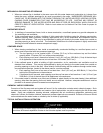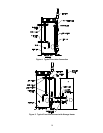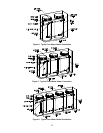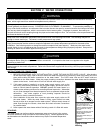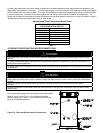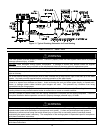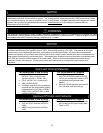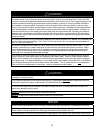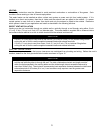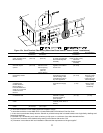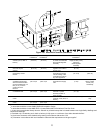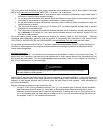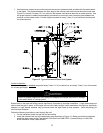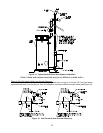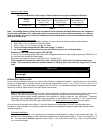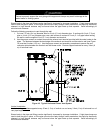
21
VENTING
The venting instructions must be followed to avoid restricted combustion or recirculation of flue gases. Such
conditions cause sooting or risks of fire and asphyxiation.
This water heater can be installed as either a direct vent system or power vent (air from inside) system. If it is
installed as a direct vent system, then the air intake and the exhaust vent are piped to the outside. If a power
vented system is used, then air is drawn from inside and only the exhaust is piped to the outside. Determine
which system is best for your application and install as described in the following sections.
DIRECT VENT INSTALLATION
Venting may be run horizontally through an outside wall or vertically through a roof through using either 2 inch
(5.1 cm), 3 inch (7.6 cm), or 4 inch (10.2 cm) diameter pipe. This water heater is supplied with a screened intake
and exhaust elbow referred to as the air intake terminal and the exhaust vent terminal.
NOTICE
If 4 inch (10.2 cm) pipe is used, then a use a 4 inch (10.2 cm) to 2 inch (7.6 cm) reducer fitting before
exiting the wall or roof to use the supplied screened intake and exhaust terminals.
If 3 inch (5.1 cm) pipe is used, then use a 3 inch (5.1 cm) to 2 inch (7.6 cm) reducer fitting before
exiting the wall or roof to use the supplied screened intake and exhaust terminals.
Direct Vent Terminal Location
Plan the vent system layout so that proper clearances are maintained from plumbing and wiring. Before the vent is
installed, determine the vent pipe termination location as shown in Figure 12.
NOTICE
The air intake and exhaust terminals may be located on separate outside walls or one terminal may
exit the roof while the other is through the wall. The total combined equivalent vent length must be
within the limits specified in the venting tables and the intake length cannot exceed the exhaust by
more than 30 feet (9 m). The minimum recommended vent separation distance between the intake and
exhaust terminals is 36 inches (91.4 cm). Local conditions may require a need for greater vent
separation distances.



